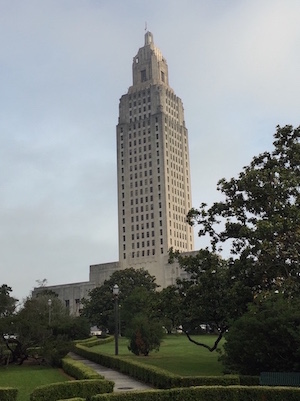Jim Beam column:Session makes major changes
Published 6:50 am Saturday, January 20, 2024

- Louisiana legislators ended their special session early and the election bill Republican Gov. Jeff Landry wanted underwent some major changes.
Republican Gov. Jeff Landry got his closed primary bill through the GOP-controlled Legislature, but it has undergone major changes made by a Senate committee. On another bill, the House Friday before the special session ended rejected an amendment to a congressional redistricting bill that had avoided splitting Calcasieu Parish between two districts.
The closed primary bill Landry wanted for all elections now will only apply to elections for Congress, the state Supreme Court, the state Board of Elementary and Secondary Education and the state Public Service Commission.
Elections for statewide public officials, members of the Legislature and local and other offices will continue to use the open primary election system that has been used since 1975. The legislation also delayed the election changes until 2026.
The bill was amended to provide that voters not affiliated with a political party may vote in a recognized party primary, but each voter can only vote in one recognized party primary.
Candidates not affiliated with a political party would be able to get on the general election ballot by petition.
The Advocate reported that political insiders said lawmakers were reluctant to approve a closed primary bill that did away with the jungle primary system that got them elected — “as it has generations of Louisiana politicos.”
The Senate approved Landry’s amended closed primary bill sponsored by Rep. Julie Emerson, R-Carencro, with a 29-9 vote. The House agreed to the Senate changes with a 67-36 vote. The 13 legislators who represent this corner of the state voted for the primary bill.
The congressional bill now splits Calcasieu Parish into the 3rd and 4th Congressional Districts. Farnum, a member of the House and Governmental Affairs Committee, sponsored the amendment keeping Calcasieu in one district that the House rejected Friday.
The Senate passed the congressional bill by Sen. Glen Womack, R-Harrisonburg without amendments. The vote was 27-11. The House passed Womack’s bill Friday with a vote of 86-14. The 13 legislators who represent this corner of the state also voted for the congressional bill.
The Louisiana Illuminator in a Thursday news release said Louisiana voters were told most states use a closed political party primary process like the one pushed by Landry. However, the news agency said Landry was pushing a more restrictive and more partisan primary than what most other states use.
The seven primaries used in this country, according to the National Conference of State Legislatures, are the closed primary, the partially closed primary, the partially open primary, a primary open to No Party registered voters, the open primary Louisiana has used since 1975, the top-two primary, and the top-four primary.
Only nine states use the closed primary where only party members can vote, which is what Landry wanted. Those states are Delaware, Florida, Kentucky, Maryland, Nevada, New Mexico, New York, Oregon, and Pennsylvania.
The open primary that Louisiana uses has candidates from all parties running in a primary. If no one gets more than a 50% majority, the top two finishers run in a general election.
California, Nebraska, and Washington have similar primaries. Landry became governor in the Louisiana primary with 52% of the vote.
Legislators draw election lines in most states after each U.S. Census. Some states let commissions do it. When legislators do it, the process becomes political.
Womack in his congressional bill, for example, clearly stated one of his major goals was to protect Republican U.S. Rep. Julia Letlow of Start and U.S. House Speaker Mike Johnson, R-Benton. As a result, Calcasieu, Ouachita, and other parishes ended up in more than one district.
Landry supporters wanted to punish U.S. Rep. Garret Graves, R-Baton Rouge, because he endorsed someone else for governor. They also had other complaints, so his district became the second minority-Black district ordered by federal courts.
Far-right Republican conservatives and U.S. House Speaker Johnson didn’t want to create the second Black district. Some Black lawmakers didn’t like features of the congressional redistricting bill, but they were forced to support it because it has that majority-Black district they wanted.
Compromise apparently saved the day. Landry didn’t get all he wanted from the session and voters didn’t get everything they wanted. Voters will be happy the open primary was saved for most political offices, but Calcasieu legislators and voters aren’t happy their parish has been split into two congressional districts.





